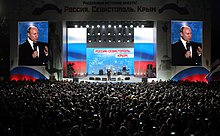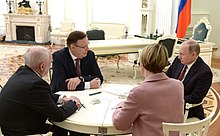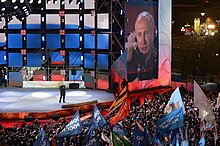Vladimir Putin 2018 presidential campaign
Vladimir Putin had consistently scored higher than 40% in opinion polls since the last presidential election.
Some political analysts believed that Putin was not going to run, which is why he refused to answer questions about his nomination.
[5] Others, on the contrary, believed that Putin would participate in the elections, but would announce it as late as possible in order to conduct a short campaign.
[8] A few hours later, speaking to the workers of the GAZ automobile plant, Putin announced that he will again run for president.
The initiative group included 668 people, among them the former Minister of Economics Alexander Shokhin, hockey player Alexander Karelin, Moscow State University rector Viktor Sadovnichy, Director of Bakulev Scientific Center of Cardiovascular Surgery Leo Boqueria, Senator and Secretary-General of United Russia Andrey Turchak, the President of Support of Russia Alexander Kalinin, co-founder of Kaspersky Lab Natalya Kaspersky, leader of the party A Just Russia Sergey Mironov, as well as members of the State Duma and senators.
He was present at the meeting of the council for education and science, where he revealed a few details of the speech he would give to the Federal Assembly.
[21] During his campaign he refused to take part in any presidential debates personally like he did in previous ones in 2000, 2004 and 2012, citing his spokesman, being "too busy".
[26][27] On 14 March, Vladimir Putin spoke at a rally in Sevastopol to mark the anniversary of the Crimean status referendum.
[30] However, during the presidential campaign, nothing was said by Putin on this subject — so that Russian citizens would not expect any changes in this socially-sensitive area.
[31] In the aftermath, more than 60% of Russians interpreted his silence as a trick aimed at securing victory in the election, which would have been questionable if he had presented his plan in advance.
[32] All this has severely affected Putin’s reputation, Forbes estimated the whole story as cynical and heavily compromising the leader of the nation.
[45] In addition to Ovechkin, the PutinTeam movement also includes many Russian sportspeople, actors, musicians and social activists: Evgeni Malkin, Yelena Isinbayeva, Sergey Karjakin, Sergey Tetyukhin, Nikolay Rastorguyev, Polina Gagarina, Ilya Kovalchuk, Nyusha, Andrey Merzlikin, Pavel Bure, Evgeni Plushenko, Nikolay Baskov, Sergei Krikalev, Mikhail Galustyan and others.
[47] Putin was present and announced the leaders of the headquarters: head of Kamaz Sergey Kogogin; head of Sirius center for gifted children Yelena Shmelyova; and CEO of Rogachev National Medical Research Center for Pediatric Oncology Alexander Rumyantsev.
According to political analysts, the Prime Minister appointed during the fourth and last term of Putin will most likely be his successor as President in 2024.
[54] In the shortlist of potential candidates for Prime Minister in case of victory of Vladimir Putin, various media, citing its sources included the following people:[55][56][57][58][59] On 7 May 2018, after being inaugurated, Vladimir Putin proposed to appoint Dmitry Medvedev as Prime Minister again.
Putin received the greatest share of votes in Chechnya, Crimea, Dagestan, Kabardino-Balkaria, Sevastopol and Tuva, and in each of these regions he gained more than 90%.







